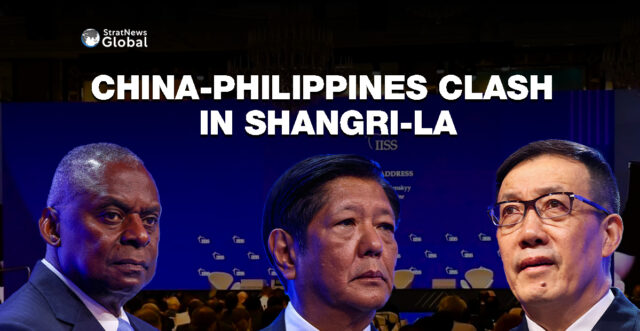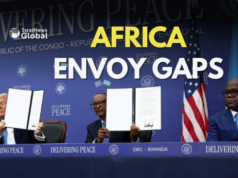China-Philippines-US Confrontation
The China-Philippines-US confrontation took a new turn over the weekend. At the Shangri-La dialogue, the trilateral war of words between China, the U.S., and the Philippines renewed. That is Asia’s premier defence summit in Singapore. The International Institute for Strategic Studies (IISS) organizes it. Speaking at a session, Philippine President Ferdinand R. Marcos Jr denounced China’s illegal, coercive and aggressive actions in the West Philippines Sea. He said, “Our efforts stand in stark contrast to assertive actions that aim to propagate excessive and baseless claims through force, intimidation and deception. Also, we have submitted our assertions to rigorous legal scrutiny by the world’s leading jurists. So, we draw the lines on our water not just from our imagination, but from international law.”
At the Shangri-La dialogue, U.S. Defense Secretary Lloyd Austin tried to refocus attention on China’s threat in the Indo-Pacific. He met his Chinese counterpart, Dong Jun, in a bid to cool friction over issues from Taiwan to China’s military activity in the South China Sea. The Philippines, a sprawling archipelago and a U.S. treaty ally is at the centre of an intensifying power struggle between Washington and Beijing.
Jing Jianfeng, the Deputy Chief of China’s Central Military Commission retorted, “These small cliques will ultimately lose more than they gain. The Americans themselves even say, ‘speak softly and carry a big stick’. The United States often uses partnerships as a small profit to lure regional countries into becoming its agents. And then tricks them into paying the bill. Whether it is the ‘Saigon moment’ or the ‘Kabul retreat’, many of the United States’ partners have become victims. The U.S.’ self-interested nature has been fully exposed. Also, this reminds me of a famous saying by the late former U.S. Secretary of State Henry Kissinger, ‘it may be dangerous to be America’s enemy, but to be America’s friend is fatal.”
(With Reuters inputs)
The 'Eye' of the story not the 'I' of the story. That's Amitabh Pashupati Revi's credo from the beginning of his professional journey in 1995. From conflicts in the war zones of Afghanistan, Syria, and Iraq to nuances of international politics in the Maldives,Thailand, and South Sudan, Amitabh has reported from all the world's continents, except for Antarctica(so far). Though, he has documented the world's third pole, the Siachen Glacier!
Amitabh reports and produces documentaries on the two-front China-Pakistan threat to India. His ground reports from Arunachal Pradesh and Ladakh have received viewership in the hundreds of thousands. Amitabh has interviewed world leaders, top global analysts, and experts in India, Russia, the United States, and Australia as well. Along the way, he’s picked up the Russian language, the Ramnath Goenka Award for his reporting on the 'Islamic State' terrorist group in Iraq, the Khaled Alkhateb Award for his reporting from Palmyra, Syria, and the UN Dag Hammarskjöld Distinguished Journalist Fellowship. Last but not least, as a founder member of StratNews Global, Amitabh helps lead the reporting, editorial, production, and administration teams at StratNews Global, BharatShakti, and InterStellar on their journey ahead.





